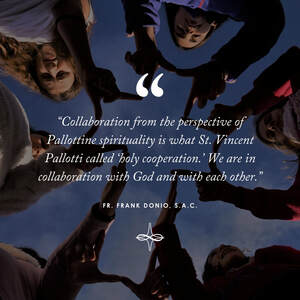 What is collaboration? Recently, during a virtual conference this question arose as it has many times in the past. People use the word, but often mean something different when they say it. For some, it is “collaboration for” –where everything is done by one person who then asks for others to help accomplish things. For others, it is “collaboration with” –which is akin to committee work, often led by one or two people, but others are asked for their opinion and input. Collaboration from the perspective of Pallottine spirituality is what St. Vincent Pallotti called “holy cooperation.” We are in collaboration with God and with each other. This form of collaboration is called “collaboration from the beginning.” Care is taken about who is present and a part of the process includes discernment. The group discerns together in “trialogue” –the Holy Spirit and the group – the issue at hand, a way forward, and then moves together. This way is that of the Cenacle, the Upper Room in Jerusalem, where the early community of the Church discerned together. It is the way of the Sent! Moving forth from the Cenacle for Christ, each with a role, all co-responsible for the mission of Christ and the Church! Some may see this way as idealistic and unachievable. For human beings alone, it is. With the grace of God, though, “all things are possible” (Mt. 19:26). May the Charity of Christ urge us on! Click here to learn more about Pallottine Spirituality. Click here to learn more about Collaboration in Ministry.
1 Comment
11/19/2020 Fratelli Tutti: On Fraternity and Social Friendship - Top Quotes from Pope Francis' Latest EncyclicalRead NowOn the vigil of the Feast of St. Francis of Assisi, the saint who influenced the choosing of Pope Francis’s papal name, Pope Francis released the encyclical Fratelli Tutti on fraternity and social friendship. Beginning with the example of St. Francis himself and continuing with the parable of the Good Samaritan, Pope Francis calls the world once again to consider the common good and to strive for unity based on fraternal charity. In doing so, he reminds humanity of an important truth: that we belong to one another. In this blog series, I’ll be sharing some of my favorite quotes from the pope’s latest encyclical. May they bring you peace, hope, and joy as we continue to grow and adapt in the midst of the COVID-19 pandemic and its effects on our world. “Let us dream, then, as a single human family, as fellow travelers sharing the same flesh, as children of the same earth which is our common home, each of us bringing the richness of his or her beliefs and convictions, each of us with his or her own voice, brothers and sisters all” (FT, 8) Today I believe that many of us have forgotten to dream. We are mired down with anxiety, isolation, pandemic fatigue, stress, financial and political uncertainty, or disillusionment. In Fratelli Tutti, Pope Francis reminds us to dream and to hope. There is room for each person at God’s table. Each person brings their own gifts, talents, knowledge, expertise, experiences, and self to the world. Rather than reject our differences, it is important to acknowledge and even celebrate the richness in our human diversity. We are many parts, but one body. Let us celebrate our humanity and practice dreaming once again—of unity, of peace, of justice, of truth, of love. “Instances of racism continue to shame us, for they show that our supposed social progress is not as real or definitive as we think” (FT, 20). As several incidents within the United States have reminded our nation once more, racism is a sin which directly contradicts the truth that all people are born with equal dignity in the image and likeness of God. The sin of racism continues to be present in our world, and eliminating it involves the intentional work and learning of each person. This process includes listening to other’s stories and journeys, learning about and from history, conducting a personal examination of conscience, and intentional action to change systems and structures of racism. Pope Francis reminds us that racism is intolerable, not only among Catholics, but among mankind as a whole. “True, a worldwide tragedy like the Covid-19 pandemic momentarily revived the sense that we are a global community, all in the same boat, where one person’s problems are the problems of all. Once more we realized that no one is saved alone; we can only be saved together” (FT, 32) Although the COVID-19 pandemic has wrought havoc on the way we live, times of hardship also remind us of what’s important. Often, we re-focus on our priorities because we are reminded not to take them for granted. Many turn to faith, family, and community and are more likely to help those who are less fortunate. Practicing gratitude is an essential component of not only surviving but thriving in times of hardship. Pope Francis points out that tragedies such as COVID-19 can bring humanity together in a common bond of fraternity. Let us turn outward during this time and use our talents and resources to bring joy, love, and hope to others. “We have the space we need for co-responsibility in creating and putting into place new processes and changes. Let us take an active part in renewing and supporting our troubled societies. Today we have a great opportunity to express our innate sense of fraternity, to be Good Samaritans who bear the pain of other people’s troubles rather than fomenting greater hatred and resentment” (FT, 77) Co-responsibility is an important theme at the Catholic Apostolate Center that has been given even greater attention in the Church today. It involves collaboration from the beginning and values the important contributions each person brings to the Church and world. St. Vincent Pallotti, patron of the Catholic Apostolate Center, understood that the Church cannot thrive and spread the Gospel without the active participation of the clergy, religious, and laity. Today, Pope Francis reminds us that we all have a role to play in the renewal of the Church and world. This begins when we can accompany our brothers and sisters, stand in solidarity with those who are hurting, and bring them the joy of the Gospel. “Solidarity finds concrete expression in service, which can take a variety of forms in an effort to care for others” (FT, 115) Charity comes alive in works, just as St. Paul says, “faith without works is dead.” The Gospel is lived today through our actions—an understanding promoted in Catholic Social Teaching and exemplified through the corporal and spiritual works of mercy. It is one thing to express solidarity with our brothers and sisters, but a very different thing to walk alongside and serve them. Pope Francis is calling us to both. As we are reminded in Gaudium et Spes, “Man…cannot fully find himself except through a sincere gift of himself” (24). “Nor can we fail to mention that seeking and pursuing the good of others and of the entire human family also implies helping individuals and societies to mature in the moral values that foster integral human development...Even more, it suggests a striving for excellence and what is best for others, their growth in maturity and health, the cultivation of values and not simply material wellbeing. A similar expression exists in Latin: benevolentia. This is an attitude that ‘wills the good’ of others; it bespeaks a yearning for goodness, an inclination towards all that is fine and excellent, a desire to fill the lives of others with what is beautiful, sublime and edifying” (FT, 112) In the Christian worldview, politics, economics, culture and society must be built and exist for the common good. They are man-made structures designed to serve this purpose. In pursuing the common good, we aim to create a society in which mankind can flourish as a result of respect for every person’s inherent dignity. As St. Thomas Aquinas stated, “Love wills the good of the other.” Pope Francis echoes this truth and reminds us that willing this good is comprehensive: we must care about one another’s spiritual well-being as well as our physical well-being. When man’s fundamental needs are met—when he is cherished, nurtured, respected, fed, and rested—he is better able to “fill the lives of others with what is beautiful, sublime and edifying.” He is able to reach out and better experience and rest in the divine. To learn more about Fratelli Tutti, please click here. 11/12/2020 Holy Detachment During COVID-19: Learning from the Examples of St. Vincent Pallotti and Fr. ChaminadeRead NowIn the last few years, Stoic philosophy has had a new renaissance in our modern culture. Based on the idea that we cannot control our outside surroundings, but can control how we respond, this ancient Roman philosophy is quite appealing to the twenty-first century—especially today when very little seems to be in our control. What I have found helpful from Stoic philosophy during this time is the understanding that we cannot control other people’s actions. We cannot control whether other people maintain social distancing or wear masks. In an election year, we cannot force the outcome that we feel is best for the country. We cannot control whether we work from home, whether schools open, or even when we can see friends. It can be disheartening to see the challenges around us. But a point of convergence between Stoicism and Christianity is an understanding of detachment that reminds us that, while the world is out of our control, we can control how we respond. We can wear masks, maintain social distancing, vote, or schedule virtual meet-ups. Most of all, as Christians, we can pray—turning to the One who is in control and who invites us to use our free will to cooperate with Him. During this pandemic, I have been reminded of one of my faith heroes, Blessed William Joseph Chaminade. As a priest in Revolutionary France, he must have felt like the apocalypse was here and now. Nevertheless, he went into hiding, offering the sacraments in shuttered rooms. When he was in mortal danger, Father Chaminade fled for Saragossa, Spain, where he prayed constantly to Our Lady of the Pillar. The Blessed Mother entrusted the exiled priest to form a society of priests and brothers who worked closely with the laity to re-Christianize France. I cannot help but compare his vision to that of St. Vincent Pallotti, patron of the Catholic Apostolate Center and founder of the Pallottine order. Both men passed away on January 22, 1850. Both of these men also had the Christian understanding of holy detachment to God’s will, as well as a commitment to cooperating with God’s grace to further build up the Kingdom. Rather than complain or say "woe is me," they saw that the world around them needed to change—beginning with themselves. They humbly realized that they could not do this alone, but rather relied on the strength of God: Father, Son, and Spirit. Learning about both of these men and living in a time with many similarities to that of Pallotti and Chaminade, I feel like my time at the Catholic Apostolate Center as an intern has been encouraging. I see the continuity of the spirituality of St. Vincent Pallotti and a convergence with some of the ideas of Father Chaminade. The Center, like these two holy men, promotes the collaboration of the laity and the clergy in building up the church and affirms that all the baptized are called to personal holiness. My internship with the Center has reminded me that life does get tough, but we have a bona fide solution: Jesus Christ. We can do little by ourselves, but when we unite with the Body of Christ, we come together through His inspiration and our actions are multiplied. I am proud to be an intern at the Catholic Apostolate Center, which lives out the rich tradition of the Pallottines. We are all on mission, working in the vineyard of the Lord. As servants of the Greatest Servant, we are called to walk with each other as we work. Through coffee breaks, check-ins, and many kind emails, I feel I am being accompanied—even during this strange work-from-home scenario. I know that my work with COVID resources and social media will not transform the world overnight, but working with a community of people who put Christ first can and will make waves. Our faith, especially as lived out in the persons of Chaminade and Pallotti, encourages us to come close to the Father, Son, and Spirit, who bring our humble work to new heights. "What about you? What are you going to do?" These are the words of Pope Leo XIII to St. Katharine Drexel, whose feast day we celebrate today, when she spoke to him of the needs of the missions in Wyoming. The Holy Father’s response stopped Sister Katharine in her tracks, but it also made her reconsider how she approached her life of faith. Sister Katharine returned to the United States and went on to found over fifty missions for Native Americans, a system of schools for Black Catholics, and various other mission centers and schools. Every day, Christ poses to us a question similar to the one Pope Leo XIII posed to St. Katharine Drexel: “What about you? What are you going to do?” Pope Francis spoke of this encounter when he visited Philadelphia for the World Meeting of Families in 2015. He commented on the fact that St. Katharine was herself young and full of fervor for the Lord and wondered rhetorically how many young people around us have a similar energy and fervor. He asked in his homily at Sts. Peter & Paul Cathedral in Philadelphia “Do we challenge them? Do we make space for them and help them to do their part? To find ways of sharing their enthusiasm and gifts with our communities, above all in works of mercy and concern for others? Do we share our own joy and enthusiasm in serving the Lord?” The Holy Father touched on the call of all of the baptized to be missionary disciples. This call requires us to be open to all that the Holy Spirit may be guiding us to while still carrying forth the legacy of the past. The third major point that the Holy Father addressed was the role of the laity. He said, “We know that the future of the Church in a rapidly changing society will call, and even now calls, for a much more active engagement on the part of the laity.” The Holy Father’s point is that to properly answer the question, “What are you going to do?,” there must be collaboration by and co-responsibility of the lay faithful who work together with the ordained to make manifest the redemptive and salvific nature of the Church of Jesus Christ. The Holy Father then reminds us that this collaboration and co-responsibility is not a game of power and position. He says, “This does not mean relinquishing the spiritual authority with which we have been entrusted; rather, it means discerning and employing wisely the manifold gifts which the Spirit pours out upon the Church.” Each of us have been given different gifts and charisms that build up the Kingdom of God; the Holy Father challenges us to use them. The questions that Pope Leo XIII asked St. Katharine Drexel are the questions of vocation. In both our universal call to holiness that we receive from our baptism and in our particular vocation, we are faced with these questions: “What about you? What are you going to do?” We are not necessarily called to build up schools and mission centers as did St. Katharine, but to answer these questions we must be willing to be open to where the Spirit is guiding us, to see how our gifts and talents can be best utilized for the Kingdom and to answer our call to be “leaven of the Gospel in our world.” For more resources on missionary discipleship, please click here. For more resources on collaboration and co-responsibility, please click here. “The religious commitment to procure the propagation of the Holy Faith throughout the world cannot be separated from that to procure to revive the Faith, and to rekindle Charity among Catholics, and this not only because such is the order of Christian Charity, but also because there is a need to rekindle the Holy Faith and to rekindle Charity among Catholics.” – St. Vincent Pallotti (OOCC III, 16)
As we celebrate today the 8th anniversary of the Catholic Apostolate Center during this Extraordinary Missionary Month declared by Pope Francis, these words of St. Vincent Pallotti offer us a summary of the interconnection of the Church’s missionary efforts, encompassing what we now call Evangelization and New Evangelization. Pallotti understood this in the first half of the nineteenth century. He knew then what the Church is calling for now, co-responsibility of all the baptized for the mission of Christ and his Church. We are all sent forth as apostles, as missionary disciples! The Center accomplishes its mission of reviving faith, rekindling charity, and forming apostles through intense collaboration, or “holy cooperation” as Pallotti would call it, with God and others. The only way the Center has come to this day is through the great collaboration among staff, collaborators, advisors, Pallottines, consultants, affiliates, and many others who are co-responsible for its mission. The Holy Spirit who came upon the Blessed Virgin Mary and the Apostles and disciples in the Cenacle in Jerusalem has sent us forth and guided us in ways that we could never have imagined back in 2011 when the Center began. We do this always in service of Christ and his Church just as Pallotti did. Thank you for your support of our efforts and know that our prayers are with you! Mary, Queen of Apostles, pray for us! St. Vincent Pallotti, pray for us! May the Charity of Christ urge us on! The Catholic Apostolate Center has had a presence at the Mid-Atlantic Congress (MAC) since 2013. Over these years, we have created spaces for attendees to gather and network; to share our resources and programs in the exhibit space; and to offer our expertise on various topics facing Catholic leaders today. This work is not done on our own: it is accomplished through great collaboration among the planners of the Congress, our presentation partners, and our team. I have had the opportunity to be the point person for the Center’s involvement with MAC since we first started attending. Over the years I have been able to work with our team and our collaborators to develop presentations that are interesting, relevant, and useful in the Church today. Each year, I am always struck by the work of the Holy Spirit in each of the aspects of our involvement with MAC, and this year was no exception. Our two presentations brought together members of our team with two outside collaborators from the Archdioceses of Los Angeles and Washington. Our first presentation, titled “What now? Vocational Discernment and Accompaniment After the 2018 Synod,” focused on the experiences of three young adults who were in Rome during last year’s Synod on Young People, the Faith, and Vocational Discernment. We had many conversations prior to the event about what each presenter would talk about and how they would present, but I was still struck while watching the presentation at how alive the Church is in her young people. Our second presentation, titled “Using Social Media and Digital Resources to be Catholic Evangelical Witnesses,” helped Catholic leaders learn more about how to use social media and other digital resources to evangelize within their parishes, dioceses, and organizations. At the Center, social media and digital resources are part of our everyday work, so it is easy for me to forget how useful these tools may be for a group or parish starting to reach out by those means. Our team gave insight into the various platforms, but also offered suggestions about how to use social media in a productive, charitable way. St. Vincent Pallotti, the patron saint of the Catholic Apostolate Center, encouraged collaboration among clergy, religious, and the laity when he was a priest in Rome in the early 19th century. His message of collaboration is still true today and a goal the Center strives for in all that we do. Events like the Mid-Atlantic Congress are a great way to live out St. Vincent Pallotti’s hope – we can grow who we are individually, spiritually, and organizationally when we work in collaboration with one another. Editor's Note: This article originally appeared in the September 6th, 2018 edition of the Catholic Apostolate Center's eNewsletter.
It is no secret that the Church is facing turbulent times. The Catholic Apostolate Center would like to express deep and heartfelt sorrow to all victims of clergy sexual abuse. Our Director, Fr. Frank, will be offering a Novena of Masses for Victims of Sexual Abuse from September 7 to September 15 (Memorial of Our Lady of Sorrows). We invite all to join us in prayer. It is important to care for those who are suffering and to remember self-care. If you or someone you know needs information, support, or resources regarding stress and trauma, we invite you to our Self-Care for Healthy Ministry Resource Page. There, you can find resources from SLIconnect, the education ministry of Saint Luke Institute. You will be directed to the following resources:
Please use the virtue of prudence to determine if a licensed and/or medical professional should be involved when dealing with stress and trauma. In these difficult times, the Church will move forward with an increased role of the laity, which will require greater co-responsibility and collaboration among the faithful with clergy. Our Collaboration in Ministry Resources unpack what healthy and fruitful collaboration looks like. On this resource page, you will find many talks, blogs, articles, websites, podcasts, and more, all aimed at maximizing the resources in the Church in a healthy and productive way for the salvation of souls. You can listen to our new podcast on co-responsibility by clicking here, and you can view our Collaboration in Ministry Resources by clicking here. Finally and most importantly, we must remember that our faith life is in Jesus Christ and through his Church. To properly orient ourselves, we invite you to study the message of Pope Francis in his third Apostolic Exhortation, Gaudete et Exsultate (Rejoice and be Glad). Pope Francis seeks “to repropose the call to holiness in a practical way for our own time, with all its risks, challenges and opportunities (GE 2).” We encourage you to visit our Gaudete et Exsultate Resource Page to read this timely exhortation, and to find media and other resources to help you distill the Holy Father’s call to holiness. A Facebook Live event with Fr. Frank is particularly helpful and can be viewed by clicking the image, or here. Visit our Gaudete et Exsultate Resource Page by clicking here. Yours in the Charity of Christ, The Catholic Apostolate Center Team The call to evangelize is at the heart of our Christian faith. We are evangelizers at our core; it makes up our very identity. And yet, if I were to ask most people sitting in the church pews at Mass if they are evangelists, they would probably shake their heads and identify themselves in other terms: vocation, occupation, role in the family, country of origin. A professor of mine in graduate school put it starkly when he said most of the laity are experiencing an “identity crisis.” We do not know, or have forgotten, who we are as members of the Body of Christ and what our role is within it. Today, Pope Francis echoes his predecessors in reminding the laity of their call to become missionary disciples. This is a call that originates from God Himself, with the Risen Christ saying to his beloved disciples before ascending to the Father, “Go and make disciples of all nations.” These words reverberate ever more powerfully for us today. Though the universal call to holiness and a greater emphasis on evangelization has roots in the papacy of Pope Paul VI and within the Second Vatican Council, Pope Francis calls the concept of sharing our encounter with Jesus Christ using the means available to us “missionary discipleship.” It is a profound concept that Pope Francis assures us is relatively simple. “The new evangelization calls for personal involvement on the part of each of the baptized,” he writes in Evangelii Gaudium. “Every Christian is challenged, here and now, to be actively engaged in evangelization; indeed, anyone who has truly experienced God’s saving love does not need much time or lengthy training to go out and proclaim that love.” Once we have encountered Jesus Christ and His merciful love, we are called to bring that encounter to others, therefore playing a unique role in salvation history. Several of my colleagues from the Catholic Apostolate Center and I were honored to discuss “The Call to Missionary Discipleship” at the Catechetical Day hosted by the Archdiocese of Washington in late October. We discussed that, as baptized Christians, we have been given the grace of Jesus Christ in order to respond to the both daunting and exhilarating call to “go out to all the nations.” This understanding of evangelization subsists not only on our personal encounter with God’s transforming love, but also on our proclamation of it. It is not enough to encounter Jesus Christ for ourselves. Like the woman at the well, we must go forth telling anyone who will listen, “Come see a man who told me everything I have done.” Below are five practical tips we came up with for living out the call to be a missionary disciple. What are we missing? Feel free to add to our list by commenting on our post below! 1. Collaboration If we are to be missionary disciples, we must be people of collaboration. This does not mean that we attend endless meetings, join committees, or fill every moment of our schedule. We propose collaboration from the beginning, which means a willingness to begin an endeavor communally with others—recognizing the valuable role each person has. Collaboration must happen among, for, and with those in our parishes and organizations. It requires openness to the promptings of the Holy Spirit, humility, dialogue, and flexibility. How can you learn from others in your community, parish, family, workplace, or neighborhood? How might God use the gifts and talents of a diverse group of people to strengthen His kingdom on earth? 2. Technology As followers of Jesus Christ, we are called to use the tools of this present age in order to re-present the Gospel to our world in a way that is innovative and re-invigorated. A major tool today that can be used to spread the Gospel message is technology, especially the internet. We can share digital content that is valuable, such as Scripture, the Catechism, and Papal and Conciliar documents, in order to become better informed about our faith. Technology can also create a new type of community, enabling us to connect with others and share information in a way that is cost-effective and not limited to physical proximity. What are some ways you can use technology to spread the Gospel and help build a civilization of love? 3. Community/Parish Life We do not exist in isolation. As Christians, our work of evangelization will not bear much fruit if we do it alone. Our community, especially our parish, strengthens us and equips us to go outside our church walls in order to evangelize. It is within the parish that we receive the sacraments, especially the Eucharist, which gives us the grace of Christ Himself. In order to be effective as missionary disciples, we are called to have a vibrant sacramental life strengthened by our communities. How does your parish community strengthen you for your mission of discipleship? 4. Relationships Relationships outside of the parish are also crucial to missionary discipleship. As mentioned above, we do not exist in isolation. Do we have a mentor or spiritual guide helping us to grow in our faith life? Do we have relationships or friendships that hold us accountable and push us to become better witnesses of faith? By developing faith-filled relationships and surrounding ourselves with mentors and guides, we ensure that we continue to grow in our role as missionary disciples. 5. Prayer Prayer is crucial not only to a life of missionary discipleship, but to the Christian life overall. Prayer is the foundation for our relationship with God, inviting us to get to know ourselves more deeply through his gaze of love and mercy and helping us to better understand our specific mission in building up the Body of Christ. Prayer can, and should be, both personal and communal. God speaks in the silence of our hearts, as well as through others. Are we carving out time in silence to converse with God and hear the promptings of the Holy Spirit? Do we read Scripture, pray the Rosary, journal, sing hymns, or reflect? By having an active prayer life, we will be better equipped to become fruitful missionary disciples. The call to missionary discipleship is both daunting and exciting, and we can live it out at any time. As Pope Francis wrote in Evangelii Gaudium, “Being a disciple means being constantly ready to bring the love of Jesus to others, and this can happen unexpectedly and in any place: on the street, in a city square, during work, on a journey.” Above, I’ve listed a few tips to fulfilling our call to become missionary disciples. What would you add to the list? Editor's note: This post was originally published in November 2017. Since its publication, the Catholic Apostolate Center has expanded its vision and resources for living as missionary disciples. Please see our "Living as Missionary Disciples" resources page and our 2017 e-book Living as Missionary Disciples: a Resource for Evangelization that was produced in collaboration with the USCCB. “But this I will call to mind; therefore I will hope: The Lord’s acts of mercy are not exhausted, his compassion is not spent; They are renewed each morning—great is your faithfulness!”
-Lamentations 3:21-24 Reflecting on the theme for this year’s Mid-Atlantic Congress—"Hope”—I feel as though the idea of hope seems a radical one to even consider today. Every morning, we’re confronted with more bad news: refugees, war, political espionage, starvation, violent crime, and even mass shootings in our own communities. It’s enough to make you throw up your hands and cry out, “Just make it stop!” And that’s exactly why we need hope. With the current state of the world, focusing on the theme of hope is one of the most important things we can do as a community of faith. We often hear that things are in crisis: the family, the Church, our nation, our whole world. But what we encountered at MAC this year looked nothing like crisis. In fact, it looked very much like hope. In our conversations with participants, the Catholic Apostolate Center staff witnessed a fire that, in charity and love, seeks to transform the world with the good news of the Gospel. And while it’s easy to get caught up in the excitement of being surrounded by passionate and hard-working people, there are ways we can carry that hope and momentum forward into our parishes and communities. The Catholic Apostolate Center participated in four presentations this year at the Mid-Atlantic Congress. In our presentation discussing Living as Missionary Disciples, the U.S. Bishops’ guide for pastoral planning, we were able to provide basic principles of missionary discipleship and evangelization. We talked about where the Church in the United States is heading with its evangelization and pastoral planning efforts and together brainstormed practical ways to implement these ideas in our own parishes and dioceses. By collaborating with other members of the Church, and helping to form missionary disciples, our work can change the narrative of hopelessness we often see in the world. The Center also engaged in fruitful conversation about how to equip young adults to enter into the mission the Church calls us to: becoming missionary disciples, or everyday evangelizers. The session highlighted work being done in several archdiocesan and post-collegiate formation programs, such as Apostles on Mission. We also reflected on the importance of fostering a greater sense of vocational discernment among young adults—a theme on which the Church will continue to reflect in the upcoming Synod on Young People, the Faith, and Vocational Discernment. Regarding our schools, the Center had the opportunity to reflect on the complexities of the role of principals as Lay Ecclesial Ministers. Acting as part-administrator, teacher, janitor, crying shoulder, cheerleader, and lunch monitor, a principal is also a school’s connection to the local parish and diocese. They take on a complex role in today’s world and, from the discussion in our session, are eager to renew their commitment to helping form the next generation of missionary disciples. Finally, the Center unpacked the idea of collaboration from the beginning as it can apply to pastoral planning. With so many new (rather, renewed) ideas being proposed by Pope Francis and the bishops, wrapping one’s head around the various buzz words, new terminology, or different pastoral methodologies can seem overwhelming. Our conversation touched on co-responsibility, missionary discipleship, and entering into pastoral planning with a spirit of discernment and collaboration. It was encouraging to see pastoral leaders rising to the challenge of being co-responsible missionary disciples ready to share the hope of Jesus Christ. At MAC this year, we experienced hope: hope in the Lord, hope that will not disappoint, and hope that sends us forth. We saw the excitement and fire that comes from hope, which will be taken home to our parishes, schools, and dioceses to transform the world. We thank all who engaged in conversation with us at MAC and challenge you to proclaim the hope of the Gospel to the world. To listen to our presentations from this year’s Mid-Atlantic Congress, please click here. "Remember that the Christian life is one of action; not of speech and daydreams. Let there be few words and many deeds, and let them be done well." – St. Vincent Pallotti
Blessings to all on the feast day of St. Vincent Pallotti! Today’s feast is not celebrated universally in the Church, even though it is listed on the Vatican’s calendar of saints. And yet, this humble Roman priest who was ordained 200 years ago this coming May 16th, by his deeds and words still affects the lives of people around the world through his legacy, the Union of Catholic Apostolate. The Catholic Apostolate Center is a 21st century expression of the charism of St. Vincent Pallotti as articulated in the General Statutes of the Union, particularly number 12: “The Union of Catholic Apostolate participates in the mission of the Church to reawaken faith and an awareness of the vocation to the apostolate, to rekindle charity among all the members of the People of God, so that they be ever more united in a commitment to spread charity and so that there be, as soon as possible, one flock under one Shepherd (cf. Jn 10, 16). Therefore, the Union, in communion with the competent Pastors, promotes collaboration among all the faithful in openness to new forms of evangelization.” The action that we take is not simply on our own, but is in collaboration and union with others and fosters greater co-responsibility for the mission of Christ and his Church. As we celebrate this special feast day today, please know that our prayers are with you. May you continue to revive faith, rekindle charity, and form apostles wherever you are and in whatever you are doing. May your words and deeds be done well! May the Charity of Christ urge us on! The call to evangelize is at the heart of our Christian faith. We are evangelizers at our core; it makes up our very identity. And yet, if I were to ask most people sitting in the church pews at Mass if they are evangelists, they would probably shake their heads and identify themselves in other terms: vocation, occupation, role in the family, country of origin. A professor of mine in graduate school put it starkly when he said most of the laity are experiencing an “identity crisis.” We do not know, or have forgotten, who we are as members of the Body of Christ and what our role is within it. Today, Pope Francis echoes his predecessors in reminding the laity of their call to become missionary disciples. This is a call that originates from God Himself, with the Risen Christ saying to his beloved disciples before ascending to the Father, “Go and make disciples of all nations.” These words reverberate ever more powerfully for us today. Though the universal call to holiness and a greater emphasis on evangelization has roots in the papacy of Pope Paul VI and within the Second Vatican Council, Pope Francis calls the concept of sharing our encounter with Jesus Christ using the means available to us “missionary discipleship.” It is a profound concept that Pope Francis assures us is relatively simple. “The new evangelization calls for personal involvement on the part of each of the baptized,” he writes in Evangelii Gaudium. “Every Christian is challenged, here and now, to be actively engaged in evangelization; indeed, anyone who has truly experienced God’s saving love does not need much time or lengthy training to go out and proclaim that love.” Once we have encountered Jesus Christ and His merciful love, we are called to bring that encounter to others, therefore playing a unique role in salvation history. Several of my colleagues from the Catholic Apostolate Center and I were honored to discuss “The Call to Missionary Discipleship” at the Catechetical Day hosted by the Archdiocese of Washington in late October. We discussed that, as baptized Christians, we have been given the grace of Jesus Christ in order to respond to the both daunting and exhilarating call to “go out to all the nations.” This understanding of evangelization subsists not only on our personal encounter with God’s transforming love, but also on our proclamation of it. It is not enough to encounter Jesus Christ for ourselves. Like the woman at the well, we must go forth telling anyone who will listen, “Come see a man who told me everything I have done.” Below are five practical tips we came up with for living out the call to be a missionary disciple. What are we missing? Feel free to add to our list by commenting on our post below! 1. Collaboration If we are to be missionary disciples, we must be people of collaboration. This does not mean that we attend endless meetings, join committees, or fill every moment of our schedule. We propose collaboration from the beginning, which means a willingness to begin an endeavor communally with others—recognizing the valuable role each person has. Collaboration must happen among, for, and with those in our parishes and organizations. It requires openness to the promptings of the Holy Spirit, humility, dialogue, and flexibility. How can you learn from others in your community, parish, family, workplace, or neighborhood? How might God use the gifts and talents of a diverse group of people to strengthen His kingdom on earth? 2. Technology As followers of Jesus Christ, we are called to use the tools of this present age in order to re-present the Gospel to our world in a way that is innovative and re-invigorated. A major tool today that can be used to spread the Gospel message is technology, especially the internet. We can share digital content that is valuable, such as Scripture, the Catechism, and Papal and Conciliar documents, in order to become better informed about our faith. Technology can also create a new type of community, enabling us to connect with others and share information in a way that is cost-effective and not limited to physical proximity. What are some ways you can use technology to spread the Gospel and help build a civilization of love? 3. Community/Parish Life We do not exist in isolation. As Christians, our work of evangelization will not bear much fruit if we do it alone. Our community, especially our parish, strengthens us and equips us to go outside our church walls in order to evangelize. It is within the parish that we receive the sacraments, especially the Eucharist, which gives us the grace of Christ Himself. In order to be effective as missionary disciples, we are called to have a vibrant sacramental life strengthened by our communities. How does your parish community strengthen you for your mission of discipleship? 4. Relationships Relationships outside of the parish are also crucial to missionary discipleship. As mentioned above, we do not exist in isolation. Do we have a mentor or spiritual guide helping us to grow in our faith life? Do we have relationships or friendships that hold us accountable and push us to become better witnesses of faith? By developing faith-filled relationships and surrounding ourselves with mentors and guides, we ensure that we continue to grow in our role as missionary disciples. 5. Prayer Prayer is crucial not only to a life of missionary discipleship, but to the Christian life overall. Prayer is the foundation for our relationship with God, inviting us to get to know ourselves more deeply through his gaze of love and mercy and helping us to better understand our specific mission in building up the Body of Christ. Prayer can, and should be, both personal and communal. God speaks in the silence of our hearts, as well as through others. Are we carving out time in silence to converse with God and hear the promptings of the Holy Spirit? Do we read Scripture, pray the Rosary, journal, sing hymns, or reflect? By having an active prayer life, we will be better equipped to become fruitful missionary disciples. The call to missionary discipleship is both daunting and exciting, and we can live it out at any time. As Pope Francis wrote in Evangelii Gaudium, “Being a disciple means being constantly ready to bring the love of Jesus to others, and this can happen unexpectedly and in any place: on the street, in a city square, during work, on a journey.” Above, I’ve listed a few tips to fulfilling our call to become missionary disciples. What would you add to the list? To learn what the Catholic Apostolate Center is doing to form missionary disciples, click here to learn about Apostles on Mission. Today we celebrate the sixth anniversary of the Catholic Apostolate Center. In these six years, we have been to countless conferences; developed relationships with numerous national organizations and dioceses; shared thousands of saint images on Facebook; emailed hundreds of newsletters; and collaborated with bishops, priests, religious, diocesan officials, lay ministers, and Catholic leaders from around the world. In these six years, we have appreciated the collaboration with each and every one of you and look forward to continued development of programs and resources to revive faith, rekindle charity, and form apostles.
In celebration of this anniversary, we invite you to view our updated introduction video of the Center. This video highlights the mission of the Center and our constant desire to live as missionary disciples. Please be assured of our prayers for you through the intercession of Mary, Queen of Apostles and St. Vincent Pallotti, patron saints of the Catholic Apostolate Center. May the Charity of Chris urge us on! "One of the great challenges facing the Church in this generation is to foster in all the faithful a sense of personal responsibility for the Church's mission, and to enable them to fulfill that responsibility as missionary disciples, as a leaven of the Gospel in our world. This will require creativity in adapting to changed situations, carrying forward the legacy of the past not primarily by maintaining our structures and institutions, which have served us well, but above all by being open to the possibilities which the Spirit opens up to us and communicating the joy of the Gospel, daily and in every season of our life." -Pope Francis Change is a challenge. Throughout the United States and in many countries of the world, the way in which Catholicism is lived is changing. The Church calls us to encounter Jesus Christ every day, accompany others on the journey of faith similar to the Road to Emmaus, welcome and continually deepen discipleship in the community of faith through worship, faith formation, and service to others, and be sent forth as missionary disciples or apostles to proclaim in word and deed through sharing our faith in Christ and living lives of charity and justice. All are co-responsible for the mission of Christ and his Church. Simply maintaining our parish programs and ministries is not enough. Working together collaboratively through discerned action in and through the Holy Spirit offers us a way forward. The Bishops of the United States have issued an unprecedented invitation to Catholic leaders to join with them in discerning together with all the faithful the ways in which the Church in the United States can more fully live the joy of the Gospel each and every day. The Catholic Apostolate Center is honored to collaborate with the United States Conference of Catholic Bishops (USCCB) on this important event in the life of the Church this July called the “Convocation of Catholic Leaders: The Joy of the Gospel in America.” We are also pleased to work with the USCCB on the development of a new leadership resource for evangelization and pastoral planning called, Living as Missionary Disciples: A Resource for Evangelization. The Center provides resources and consultation which aid in personal and communal discernment and action so that all the baptized may live as missionary disciples. We are simply continuing the vision of St. Vincent Pallotti (1795 - 1850) who called all the faithful to be apostles of Christ in the Church and in world. As a ministry of the Immaculate Conception Province of the Society of the Catholic Apostolate (Pallottine Fathers and Brothers). The Center offers its resources at no cost as a service to the missionary and evangelization efforts of the Church. We invite you to share our many resources with others. Our prayers are with you in your continued deepening and living of missionary discipleship. May the charity of Christ urge us on! Question for Reflection: How is Christ calling you to use your gifts and talents to become an effective missionary disciple?
“I extend my greetings to all the members of the Society of Catholic Apostolate and to all who share the charism of St. Vincent Pallotti. He has become an enlightening and inspiring beacon in the Church. His charism is a precious gift of the Holy Spirit, because it has given rise to and continues to call forth various forms of apostolic life and animates the faithful to actively engage in Gospel witness.” – Pope Francis (Audience with Members of the XXI General Assembly of the Society of the Catholic Apostolate, October 10, 2016) Today is the 5th Anniversary of the Catholic Apostolate Center. It is a ministry of the Immaculate Conception Province of the Society of the Catholic Apostolate (Pallottine Fathers and Brothers). The Center came into existence through the inspiration of the Holy Spirit and the discernment of the Pallottines in collaboration with many others. Last week, I sat in the Clementine Hall of the Apostolic Palace in Vatican City and listened to Pope Francis speak the words quoted above. The charism of St. Vincent Pallotti of reviving faith, rekindling charity, and forming apostles is what permeates all that the Catholic Apostolate Center does. Our mission is a simply a 21st century way of expressing this charism. The Center is responding to the call of Pope Francis to the Pallottines: “I encourage you to push forward along your path with joy and hope, committing yourselves with all your heart and with all your strength, so that the charism of your Founder bear abundant fruit also in our time. He loved to repeat that the call to the apostolate is not reserved to some, but is addressed to everyone… to operate with renewed vigor to reawaken faith and rekindle charity, especially among the most vulnerable segments of the population, the spiritually and materially poor.” On behalf of the Pallottines, the Board, Staff, Collaborators, and Advisors of the Catholic Apostolate Center, I offer thanks to all of those who collaborate with us, especially our affiliates, those who follow us on social media, utilize our resources, develop projects with us, and give generously in a variety of ways. Calling all to be co-responsible for the mission of Christ and his Church and to work apostolically in a collaborative way is a central element of the charism of St. Vincent Pallotti. We look forward to the years to come and plan to provide even more resources that will assist in the formation of “authentic apostles of Christ in the Church and in the world” (St. John Paul II). Please know that we at the Center are in prayerful remembrance of all those who are assisted by our ministry. May we be in prayerful solidarity with one another as Pope Francis is with us all. “I entrust all of you to the protection of Mary Most Holy, whom St. Vincent Pallotti venerated especially as Queen of the Apostles. Her good example of apostolic zeal and perfect charity, invites us to pray without ceasing to invoke the gifts of the Holy Spirit upon the apostles of today, so that the Gospel of her Son can be proclaimed in every part of the world.” May the Charity of Christ Urge Us On! In God, the Infinite Love, Fr. Frank
This past Tuesday, the Church celebrated the Solemnity of the Annunciation of the Lord. This feast, which commemorates the moment Gabriel appeared to the Virgin Mary to announce the plan of salvation God intended to bring forth, can seem a bit odd to celebrate during Lent. The Annunciation is a moment that we would usually associate with Christmas, as it introduces us to the official incarnation of God as Man. While March 25th is exactly 9 months before December 25th, I believe that celebrating the Annunciation during this time has more meaning than simply the significance of 9 months to December. In this post, I hope to share with you my thoughts on a few of the many beautiful features of this event in Christianity and how it pertains to our mission in the Liturgical season of Lent.
The Annunciation emphasizes both the importance of Mary and how the Annunciation brings the Incarnation of God into the realm of human history. I have noticed that people, when discussing this crucial event, typically compartmentalize these two aspects while forgetting their interconnectivity. I also find that this can result in one compartmentalizing their relationship with Mary and their relationship with God, failing to recognize how the two are woven together. I say this because I am certainly guilty as charged! Seeing the beautiful harmonization of the New Adam (Jesus) and the New Eve (Mary) can help us better understand the correct approach to bringing our hearts closer to God during Lent. You might then ask how this interconnectivity between Mary and the Incarnation occurs. Yes, Mary did give birth to Jesus, and many people stop there. However, I believe the harmonization is more than the mere act of Mary giving birth. This is where the Annunciation comes into play, as Mary agreed to submit herself fully to God’s will. The nature in which such agreement is founded on remains an open question. With this, however, I have found that the best answer to this question (in the span of my short, and continuously developing spiritual journey) lies in the spirituality that is the source and foundation of the Catholic Apostolate Center. In a blog I wrote some while back, I talked about God as Infinite Love, and I reference this again because I am referring to a spirituality of collaboration, where the Love of God is a collaborative invitation to participate in His will, which subsequently leads to being one with His love. We walk on our journey together with God, and this connectedness is why such a harmonization between the role of Mary and the Incarnation of Christ exists. The answer to how this harmony exists lies in the gift of free will. I mention free will because of it is important in the understanding of a collaborative relationship with God, one where we are free rather than forced to conform to His will. Another way of saying this is that God could have entered humanity, without our consent, into a new order where the original graces and gifts would be restored. However, God wanted us to love Him, and such love requires an act to freely choose Him while simultaneously rejecting something else (i.e. sin, worldly pleasures, and so forth). If God were to redeem humanity through the Incarnation of Christ, it would then be by human consent, in order that our dignity is maintained and we are ably to participate in this Infinite Love of God, and that God would offer the Incarnation (and therefore the opportunity to regain access to full participation in such Love) by means of collaboration with humanity. It is only through such collaboration that participation in the Love of God can occur. This is where our Blessed Mother, Mary, enters into the conversation. In the Annunciation, Mary is asked by the Angel Gabriel if she would freely consent to God’s plan to take humanity out of the abyss and to let him be completely enraptured by God’s Love (See Luke 1:26-35). Her response was the greatest act of liberty the world has ever seen: “Be it done unto me according to thy word” (Luke 1:38). This freedom is perfect because her Son was willed, and not merely accepted in any unforeseen or unpredictable way. There was no element of chance, but a desire of the Father to enact His will of salvation by means of collaboration. Mary, having full faith and love for God, essentially said “yes, I am willing to collaborate with Your will in order that I may participate in your Love.” Her willingness to collaborate is an act of harmonization, one that we cannot ignore in our lives of prayer and charity. With this being noted, how does this pertain to our journey of faith during the Lenten Season? Like Mary, we are called by God to collaborate with His will in order that we may grow in holiness and be ravished by His Love. The Annunciation reminds us that we have this gift of freedom to participate in such collaboration. After all, it would not be collaboration if we were forced to participate! We are shown that we can choose God and reject the things that keep us away from Him. This choice is deeply rooted to the extent that God would offer such a choice pertaining to our very own salvation, the Incarnation of His very own Son. Fortunately, we have an example, a role model who perfected this very act of freedom. That role model is Mary, as she collaborated with God’s will. Because of such a harmonization between Mary and God’s plan, the same harmonization can occur with us and God. We can pursue this harmonization with God by asking for Mary’s intercession. She can then us respond to such an invitation by saying: “Behold, I am the handmaid of the Lord. Be it done unto me according to Thy Word.” Andrew St. Hilaire is the Assistant to the Director of the Catholic Apostolate Center |
Details
Archives
July 2024
Categories
All
|
About |
Media |
© COPYRIGHT 2024 | ALL RIGHTS RESERVED

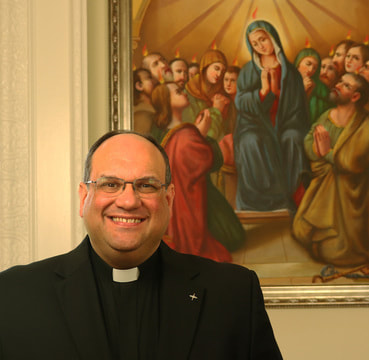



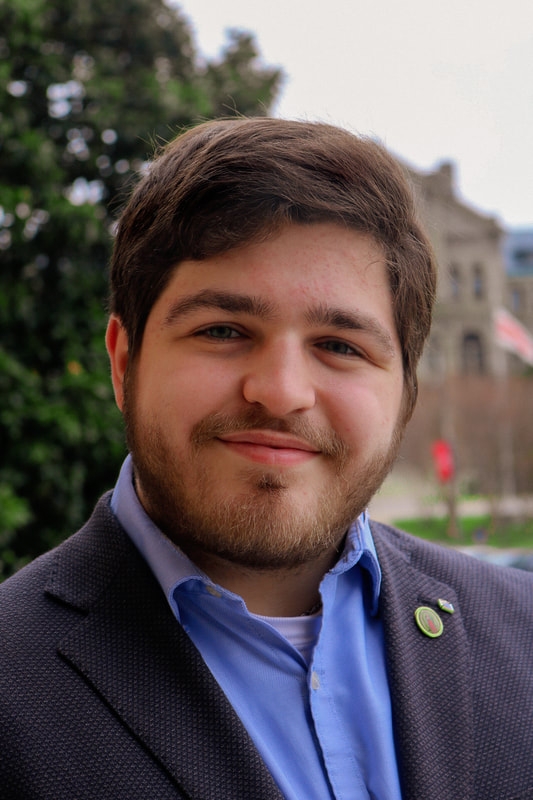


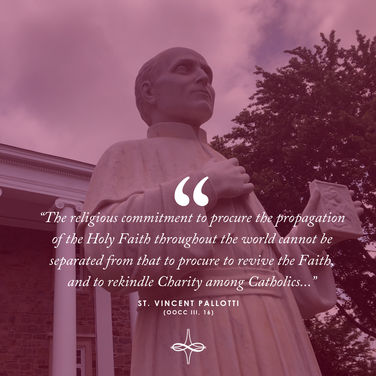
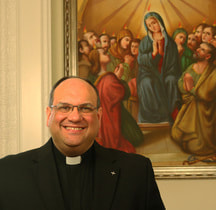
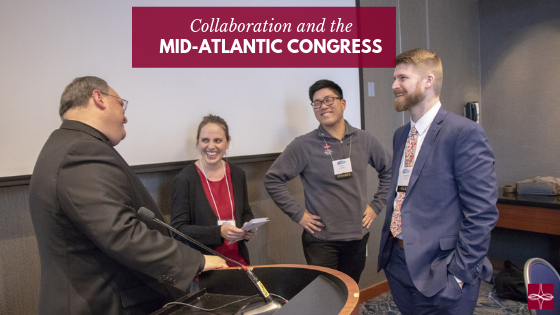

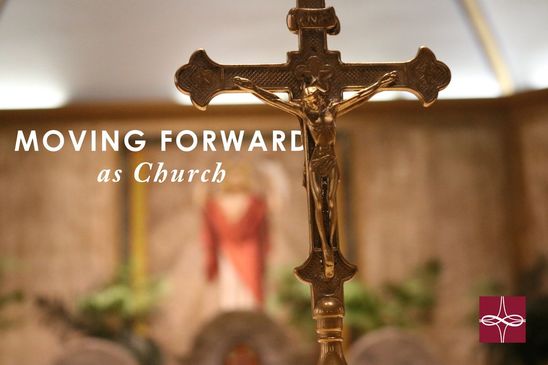




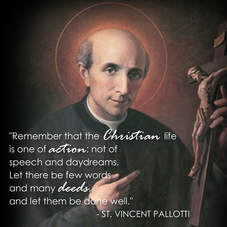
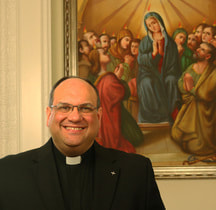


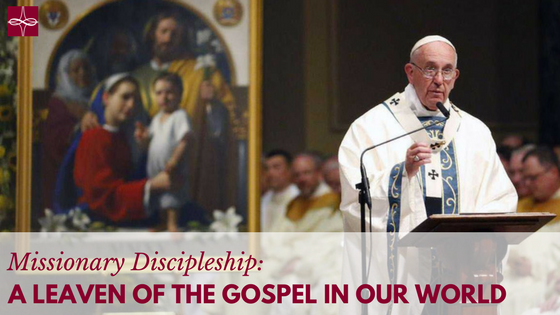
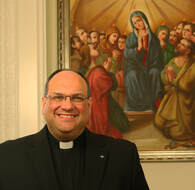
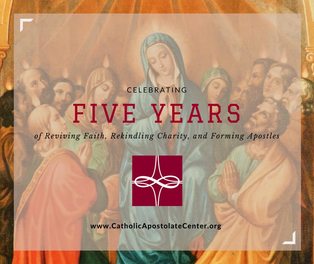
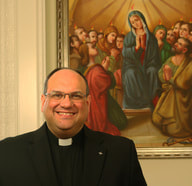

 RSS Feed
RSS Feed